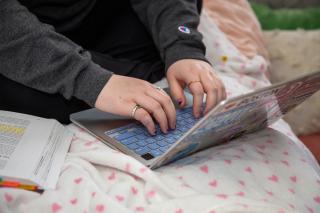This fall, the Tutoring Center received an internal grant from the Simmons Center for Information Literacy (SCIL) to hire five School of Library and Information Science (SLIS) students as Information Literacy Consultants (ILCs). We spoke with one of the new Information Literacy Consultants, dual degree student in Archives Management and History Aurora Daniel ’26, about their background and what they hope to bring to this new role.
Access to Information
“Growing up in a low-income household, I relied on libraries for essentials,” says Daniel, “[from] school books, computer and internet access to work on homework, and having a place to grab lunch in the summer. So, from a young age, I was aware of how libraries were a crucial resource for everyone, but especially those who come from underserved communities.”
This inspired Daniel to pursue a career in Library and Information Science. They want to help people learn how to identify and use the resources available to them. When the Information Literacy Consultant position was announced, they applied right away because it felt like a perfect fit.
“Information literacy is a skill that you develop just like any other: through practice,” says Daniel. “If you don't know where to start when it comes to research, there's a ton of support on campus that students can rely on.”
That’s where the role of ILC can offer guidance. Funded by the Simmons Center for Information Literacy (SCIL), the ILCs will support the Simmons librarians in providing information literacy instruction to undergraduate general education courses, as well as one-on-one instruction and group consultations for students. A series of workshops on Artificial Intelligence (AI) and Information Literacy have been scheduled to aid Simmons students, staff, and faculty in navigating this technology. Daniel will be leading “The Danger of Deepfakes” session on November 18th.
“Information literacy is essential in our current political landscape,” says JoJo Jacobson ’10MA, Assistant Dean of Academic Support. “We need more people to be able to assess what's real and what's fake news.”
The approach of the workshop series is, as Jacobson puts it, “respectfully agnostic. We're neither advocating for nor against AI; instead, we're advocating for critical thinking. It's important to engage with AI tools so we know what they're all about. As educators and as informed citizens, we should have well-informed opinions of this new technology.”
Assessing Images with Visual Literacy
“I’m most familiar with visual literacy,” Daniel says, of their information literacy experience. “I’ve worked in a museum teaching visual thinking strategies (VTS).” They are also working on an independent study on visual literacy instruction in library and information science programs.
Visual literacy, per Daniel’s interpretation, is “a set of skills developed to assess, interpret, and use images and other visual media to communicate ideas. It can be as complex as navigating AI-generated images to distinguish what's representing a factual truth or as simple as how to interpret an emoji used in a text message,” says Daniel.
“Not all images or pieces of visual media are interpreted universally, and our interpretations shift over time. So, visual literacy, like information literacy more broadly, is something people have to continually practice and improve.”
Though visual literacy is most commonly used in museums, the basic framework can be used to make sense of any piece of visual media. The strategy, as detailed in this VTS blog post, engages viewers in a discussion of an artwork by asking basic questions: What's going on in this picture? What makes you say that? What else can we find?
“It's a technique that allows everyone to participate regardless of their art historical knowledge and encourages a more conversational approach to tours,” says Daniel. “Much like other forms of visual literacy instruction, it helps participants slow down, mindfully assess what's in front of them, and draw conclusions based on what is in front of them.”
Given the proliferation of visual media created or manipulated by Artificial Intelligence (AI), Daniel finds this approach particularly useful.
AI as a Research Tool
“My goal is to help faculty, staff, and students recognize that AI is a tool, to inform them of the other tools at their disposal, and [demonstrate] how they can fact-check anything that they are getting from AI,” says Daniel. Students can also meet with an ILC to learn more about the process.
While Daniel understands the interest in using AI for conducting research, they can also see what the tool lacks. “[When a student] visits the stacks in the library or performs a search online in an academic database, [they will] often encounter something they didn't know they needed. This serendipity is one of the aspects of academic work most at risk when someone relies solely on AI to cull information or sources for them.”
Using AI in academic research is all about balance. “In an academic environment, you get out what you put in,” says Daniel. “If, when, and how you use AI can have a significant impact on your personal growth. Ultimately, my hope is to inspire students to reflect on their academic goals and how AI can be used ethically to achieve that.”
Jacobson is grateful for the guidance ILCs will offer to students. “I am so grateful to be working with Aurora and the other ILCs this term,” says Jacobson. “We're lucky to have such an amazing LIS graduate program at our institution.”
For 12 weeks this fall, the Academic Support office at Simmons is partnering with Information Literacy Consultants, the Simmons University Library, and a variety of guest speakers to lead workshops on AI and Information literacy. These workshops are sponsored by the Simmons Center for Information Literacy (SCIL), and are intended for graduate and undergraduate students as well as faculty and staff. Check out the event listings for more details.

